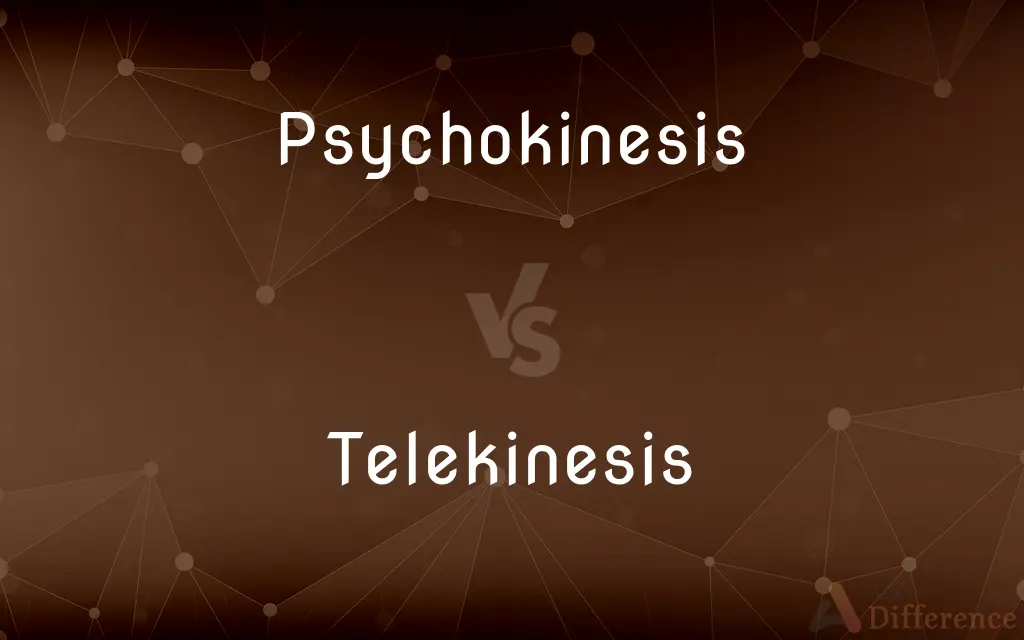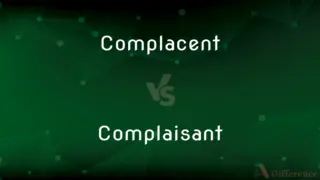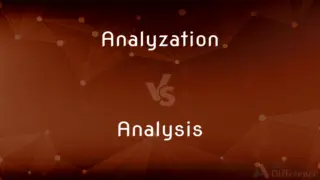Psychokinesis vs. Telekinesis — What's the Difference?
By Fiza Rafique & Maham Liaqat — Updated on March 10, 2024
Psychokinesis refers to the broad ability to manipulate matter with the mind, while telekinesis specifically denotes the movement of objects using mental power.

Difference Between Psychokinesis and Telekinesis
Table of Contents
ADVERTISEMENT
Key Differences
Psychokinesis is an umbrella term for various mental abilities to influence the physical world, including telekinesis, pyrokinesis, and more. It represents a wider range of phenomena beyond just moving objects, suggesting a deep interaction between mind and matter. On the other hand, telekinesis is a subset of psychokinesis, specifically focused on the ability to move, bend, or levitate objects without physical interaction, showcasing a more targeted manifestation of mind-over-matter.
The concept of psychokinesis encompasses a broad spectrum of supposed mental powers, from healing to affecting electronic devices, indicating a versatile but highly speculative ability. Whereas, telekinesis is often depicted with a narrower scope, concentrating on the visualization and concentration techniques to manipulate physical objects, reflecting its portrayal as a more tangible and focused skill within various media.
Researchers in parapsychology study psychokinesis within a variety of contexts, including spontaneous cases and controlled experiments. This field considers psychokinesis as part of a larger investigation into the capabilities of the human mind. Conversely, telekinesis often becomes the subject of more targeted studies and experiments, aiming to understand and measure the ability to move objects through mental focus alone, illustrating the scientific curiosity around its potential.
In popular culture, psychokinesis is portrayed through characters who possess a wide range of mental abilities, impacting the world in various ways. This broad depiction emphasizes the potential diversity of mental powers. Telekinesis, however, is frequently illustrated through specific acts, such as levitating cars or bending spoons, offering a more concentrated view of mental power in action, which captivates the imagination of audiences.
Despite ongoing interest and anecdotal reports, both psychokinesis and telekinesis lack empirical evidence and remain controversial within the scientific community. Skeptics argue that such phenomena contradict established principles of physics, positioning them more as subjects of science fiction than scientific reality. This skepticism is shared across both terms, though the specific focus on object manipulation in telekinesis often attracts more direct attempts at scientific validation.
ADVERTISEMENT
Comparison Chart
Definition
The supposed ability to influence matter with the mind in various ways.
The specific ability to move objects with the mind.
Scope
Broad, encompassing various types of mental influences on physical matter.
Narrow, focused on the movement of objects.
Examples
Healing, pyrokinesis, affecting electronics.
Levitating, bending, or spinning objects.
Research Interest
Part of broader parapsychology studies.
Subject of targeted experiments on object movement.
Popular Culture
Depicted through a wide range of mental powers.
Often illustrated by specific acts of object movement.
Compare with Definitions
Psychokinesis
Mental Influence on Matter.
The person claimed to heal wounds through psychokinesis.
Telekinesis
Subject of Experiments.
Telekinesis has been the focus of experiments attempting to validate its existence.
Psychokinesis
Parapsychology Subject.
Psychokinesis is studied in parapsychology as part of human potential.
Telekinesis
Popular in Media.
Telekinesis frequently appears in movies as a visual demonstration of power.
Psychokinesis
Broad Ability Spectrum.
Psychokinesis includes various abilities like controlling fire or electricity with the mind.
Telekinesis
Scientific Skepticism.
Like psychokinesis, telekinesis faces skepticism for lacking empirical support.
Psychokinesis
Controversial Phenomenon.
Despite claims, psychokinesis lacks scientific evidence.
Telekinesis
Mind-based Object Movement.
She demonstrated her telekinetic ability by levitating a book.
Psychokinesis
Diverse Representation.
Films often depict psychokinesis with characters having vast mental powers.
Telekinesis
Specific Mental Ability.
Telekinesis focuses on the precise skill of moving objects with the mind.
Psychokinesis
Psychokinesis (from Greek ψυχή "soul" and κίνησις "movement"), or telekinesis (from τηλε- "far off" and κίνησις "movement"), is an alleged psychic ability allowing a person to influence a physical system without physical interaction.Psychokinesis experiments have historically been criticized for lack of proper controls and repeatability. There is no good evidence that psychokinesis is a real phenomenon, and the topic is generally regarded as pseudoscience.
Telekinesis
The supposed ability to move objects at a distance by mental power or other non-physical means
She possesses the power of telekinesis
Psychokinesis
The supposed ability to move objects by mental effort alone.
Telekinesis
The supposed inducement of movement of an object by mental or spiritual power.
Psychokinesis
The production or control of motion, especially in inanimate and remote objects, purportedly by the exercise of psychic powers.
Telekinesis
(uncountable) The ability to move objects with the power of one's mind.
Psychokinesis
(parapsychology) The movement of physical systems and objects by the use of psychic power. Abbreviated as PK.
Telekinesis
An instance of use of such power.
Psychokinesis
The power to move something by thinking about it without the application of physical force
Telekinesis
The ability to move objects by means of thought alone, without physical means; - an ability claimed by certain persons, such as mediums.
Telekinesis
The power to move something by thinking about it without the application of physical force
Common Curiosities
How are psychokinesis and telekinesis depicted in popular culture?
Psychokinesis is shown as a range of powers, while telekinesis often focuses on object manipulation.
Can telekinesis be considered a type of psychokinesis?
Yes, telekinesis is a subset of psychokinesis, focused on object movement.
Is there scientific evidence for psychokinesis or telekinesis?
Both concepts lack empirical evidence and are generally considered pseudoscientific.
Can anyone develop psychokinetic or telekinetic abilities?
Claims exist about developing these abilities, but there's no verified method or evidence.
How do researchers study telekinesis?
Through controlled experiments aiming to observe and measure the phenomenon under laboratory conditions.
What types of abilities might psychokinesis include beyond telekinesis?
Beyond moving objects, psychokinesis can include healing, influencing electronic devices, and more.
Has telekinesis ever been proven in a controlled experiment?
Despite various attempts, telekinesis has not been conclusively demonstrated under controlled conditions.
Are there any historical figures known for their psychokinetic or telekinetic abilities?
Several individuals have claimed such abilities, but none have been verified under scientific scrutiny.
What is the difference between psychokinesis and telekinesis?
Psychokinesis is a broad term for mind's influence on matter, while telekinesis specifically refers to moving objects with the mind.
What role does concentration play in telekinesis?
Concentration is often described as crucial for focusing the mind's power to move objects.
What impact have psychokinesis and telekinesis had on literature and film?
They've inspired numerous works, portraying characters with extraordinary mental powers.
What might a person experiencing telekinesis feel or experience?
Descriptions vary, but often include intense concentration, a sense of connection with the object, and mental exertion.
Why do skeptics doubt the existence of psychokinesis and telekinesis?
Due to their contradiction with known physical laws and lack of reproducible evidence.
Are psychokinesis and telekinesis accepted by the scientific community?
They remain controversial and are not widely accepted due to a lack of conclusive evidence.
How do psychokinesis and telekinesis relate to other psychic phenomena?
They're part of a broader spectrum of claimed psychic abilities, including extrasensory perception and telepathy.
Share Your Discovery

Previous Comparison
Complacent vs. Complaisant
Next Comparison
Analyzation vs. AnalysisAuthor Spotlight
Written by
Fiza RafiqueFiza Rafique is a skilled content writer at AskDifference.com, where she meticulously refines and enhances written pieces. Drawing from her vast editorial expertise, Fiza ensures clarity, accuracy, and precision in every article. Passionate about language, she continually seeks to elevate the quality of content for readers worldwide.
Co-written by
Maham Liaqat













































